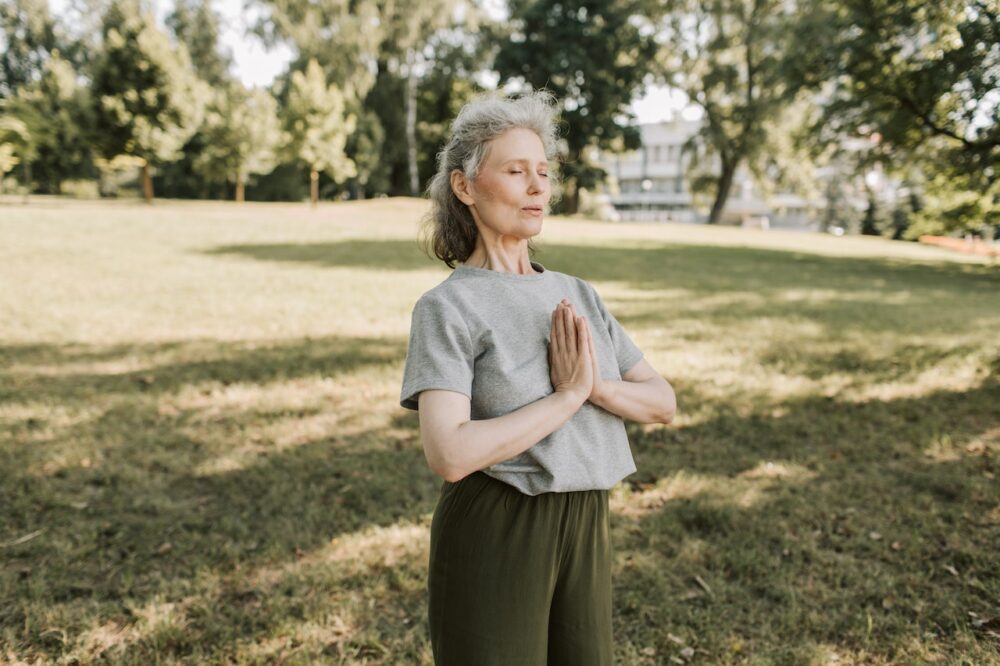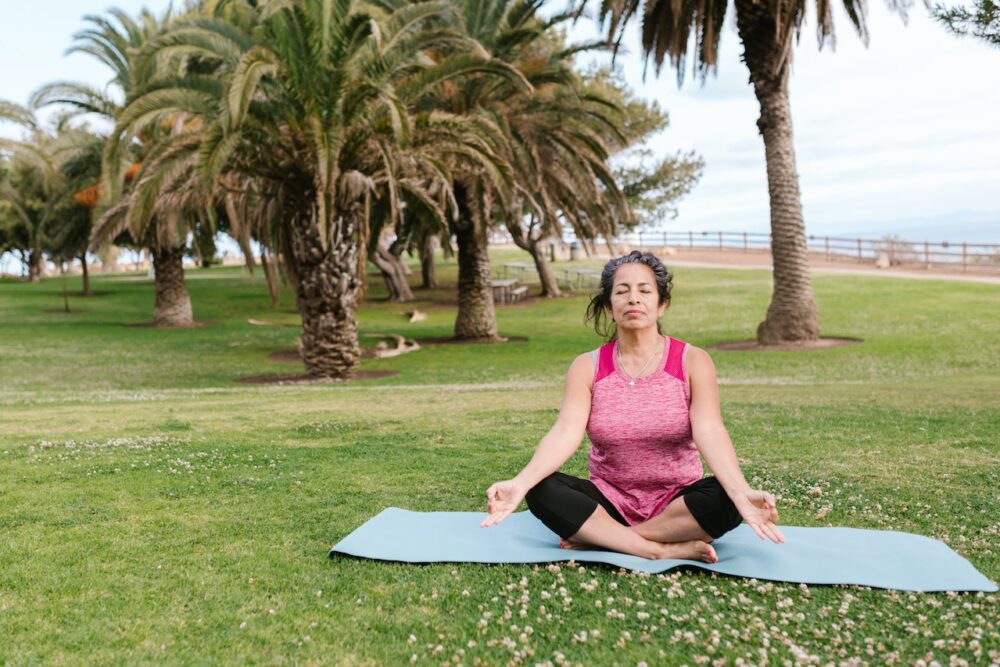As we age, it’s easy to feel that life is passing too rapidly and we can’t keep up with contemporary living. Meditation is an easy way to feel more present, focused, and alive.
Meditation may seem like something only spiritual gurus and new-age hippies do. You may doubt that sitting motionless and quieting your thoughts may improve your life. Meditation may improve mental and physical health regardless of age or background.
Maybe you want to keep your mind sharp. Maybe you wanted to feel more present and peaceful. Maybe you just want something new. Either way, meditation offers you all of that and more!
You may face unexpected obstacles in your 50s and beyond. You may have sadness, loneliness, or chronic pain. You may want to be smart and focused while you manage life’s ups and downs throughout your golden years.
Meditation may help you remain balanced, focused, and connected no matter what. We’ll discuss why beginning a meditation practice beyond 50 may be one of the finest choices you ever make in this blog article. Let’s relax, breathe, and plunge in!

Improving Focus
Meditation improves attention and concentration even as you age. We may lose memory and attention as we age. Meditation can counteract these difficulties and sharpen our thinking.
According to research, meditation thickens the prefrontal cortex, which controls attention and concentration. Four weeks of meditation training improved attention and cognitive control in persons over 50, according to a 2015 Frontiers in Aging Neuroscience research.
Meditation encourages awareness, which helps concentrate. Mindfulness trains the mind to focus on the job at hand rather than extraneous stimuli or internal thoughts.
In addition, this practice reduces stress and anxiety, which boosts attention. Stress makes it hard to concentrate. Meditation reduces stress and improves attention.
Meditation is best learned slowly. Start with a few minutes of daily meditation and gradually expand it. Find the right meditation for you. Guided meditations include guidance and visualization methods, while some prefer quiet meditation.
Improving Relationships
Meditation increases empathy and compassion, which may improve relationships, according to research. In 2013, Emotion reported that eight weeks of meditation training increased participants’ empathy and compassion.
Meditation improves communication and relationships. Trust me, I felt that when I started meditating too! Meditation promotes attention and reduces tension, making it easier to listen and reply carefully during talks. This may deepen relationships.
Meditation may also help you understand your emotions and responses, which can improve dispute resolution and relationships. Recognizing your emotional triggers helps you react better and prevent harmful actions.
Meditation may also help you make new friends. Meditation classes, like mindfulness-based stress reduction, allow you to meet like-minded people and make new acquaintances. If you’re interested in this, I highly recommend my guide on mindfulness courses right here!
Reducing Depression Symptoms
Depression may affect anybody, but older persons may find it more difficult. Meditation reduces depressive symptoms in seniors.
In 2014, JAMA Internal Medicine reported that mindfulness-based stress reduction, a style of meditation that emphasizes present-moment awareness, was as beneficial as antidepressants in treating depression in older persons.
Meditation reduces stress and depression symptoms. Cortisol, a stress hormone, may affect mood and mental health. Meditation lowers stress and regulates cortisol, improving health.
What’s more, meditation may help you concentrate on the good by building awareness and appreciation. This practice also improves sleep, which helps manage depressive symptoms. Many elderly persons have sleep issues, which may worsen depression. Meditation promotes relaxation and healthy sleep by lowering stress.
Meditation requires time and patience to master. Start small and grow your practice. To discover your ideal meditation, explore multiple forms.
Lowering Blood Pressure
Hypertension, or high blood pressure, may lead to heart disease and stroke, especially in adults over 50. Do you know what lowers your high blood pressure? That’s right – meditation.
Meditation reduced blood pressure in high-blood-pressure people in a 2013 Journal of Hypertension research. Transcendental meditation reduced systolic and diastolic blood pressure in research participants.
Meditation lowers stress and blood pressure. The stress hormone cortisol constricts blood vessels and raises blood pressure. Meditation reduces stress, which lowers cortisol and blood pressure.
Meditation relaxes and reduces inflammation, improving cardiovascular health. Reducing inflammation with meditation may protect the cardiovascular system from heart disease and stroke.
Before meditating, see your doctor if you have high blood pressure. Meditation helps lower blood pressure, but it should not replace medical care.
Helping You to Find Peace
Retirement may be exciting and scary. Over-50s may struggle to adapt to a new routine and experience loss or anxiety about the future. Meditation may provide serenity and insight at this time.
Mindfulness meditation reduced anxiety and improved well-being in older persons, according to a 2015 International Journal of Geriatric Psychiatry research. Mindfulness meditation improved happiness and well-being in the research participants after eight weeks.
Meditation enhances present-moment awareness. We feel calmer when we focus on the now and let go of past and future fears. During retirement, it’s common to worry about the future, so this might assist.
Meditation improves compassion and self-acceptance. As we age, our bodies and minds change, making it easier to criticize ourselves. Meditation may help us develop self-compassion and acceptance, which can provide calm and satisfaction at any age.
Meditation might help relieve anxiety and uncertainty as you approach retirement. In retirement, presence, compassion, and self-acceptance may improve well-being and contentment.
Decreased Risk of Cognitive Decline
Many over-50s worry about cognitive impairment in 2023. Luckily, meditation has been found to reduce age-related cognitive deterioration.
A 2018 Journal of Alzheimer’s Disease research indicated that older persons who practiced mindfulness meditation for eight weeks had substantial cognitive benefits compared to a control group. Meditators improved attention, executive function, and processing speed.
Meditation may slow cognitive deterioration by lowering stress and inflammation. Chronic stress and inflammation may cause cognitive issues including memory loss and dementia. Meditation may prevent cognitive deterioration by lowering stress and inflammation.
Meditation boosts neuronal plasticity and brain function. Neural plasticity is the brain’s capacity to establish and rearrange neural connections. Learning and memory depend on this mechanism, which declines with age. Meditation may improve brain plasticity and cognitive performance in older persons.
Meditation may prevent cognitive impairment in people over 50. Meditation may enhance brain health and cognitive performance by lowering stress, inflammation, and neuronal plasticity.

Better Sleep
Unfortunately, many over-50s fail to get enough sleep. Meditation improves sleep quality and quantity.
Sedentary lifestyles cause sleep problems in elderly persons. Daytime inactivity may cause nighttime restlessness, making it hard to fall or remain asleep. Poor sleep habits like drinking coffee or alcohol before bed or using electronics in bed may also cause sleep issues.
Meditation may help elderly persons sleep better, according to study. In 2019, the Journal of Sleep Medicine and Disorders revealed that older persons who practiced mindfulness meditation had better sleep and daytime dysfunction than a control group.
Meditation reduces tension and relaxes the body and mind, preparing you for sleep. Mindfulness meditation might help you let go of your nighttime anxieties and concentrate on the present. This This simple practice relaxes and reduces tension, helping you sleep longer and better.
Meditation may benefit over-50s who have trouble sleeping. Meditation reduces tension and promotes relaxation, making sleep easier and more peaceful.
Conclusion
Congratulations! Our meditation benefits for over-50s debate is concluded. You know that meditation improves attention, relationships, mental health, heart health, retired life, cognitive function, and sleep.
Take care of your physical and emotional wellness in this new chapter of life. Meditation helps with it. It’s easy and has huge rewards.
Meditation works for many ailments, according to accumulating evidence. Mindfulness meditation decreased despair and anxiety in older individuals, according to a 2017 Psychosomatic Medicine research. Meditation may reduce Alzheimer’s development in persons over 50, according to a 2021 Journal of Alzheimer’s development research.
Beyond science, there are many anecdotal experiences of individuals who have used meditation to improve their quality of life. My tale is too. Meditating in my early 60s changed my life. Calmer, more focused, and more connected.
Why not try meditation if you’re over 50? Start with a few minutes a day and increase. Meditation applications and community center sessions might help you start.
Finally, meditation is an easy, effective technique to age well. Life’s pressures shouldn’t get you depressed. Manage your emotional and physical health and enjoy this period of life. Happy meditating!









